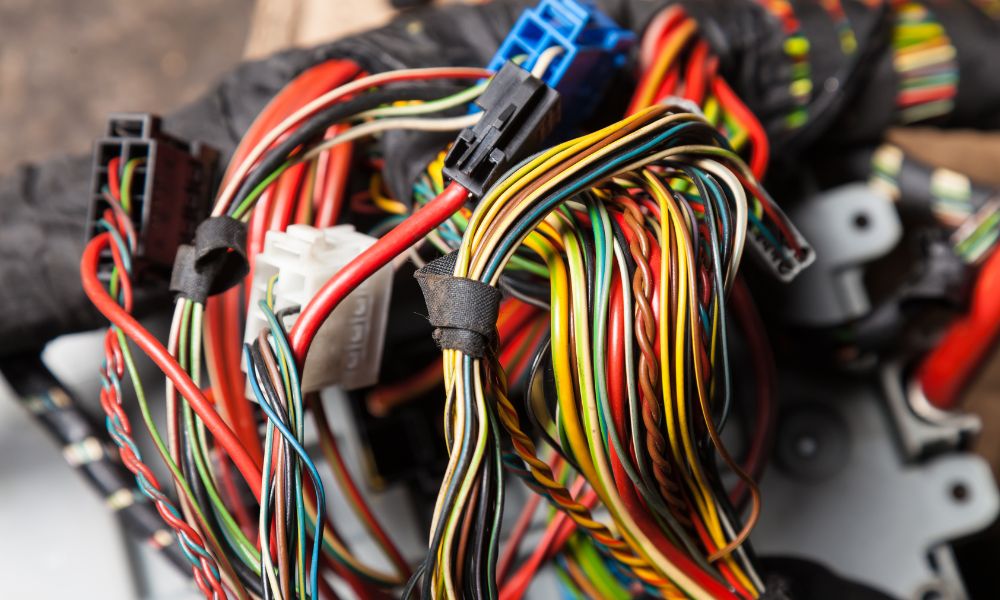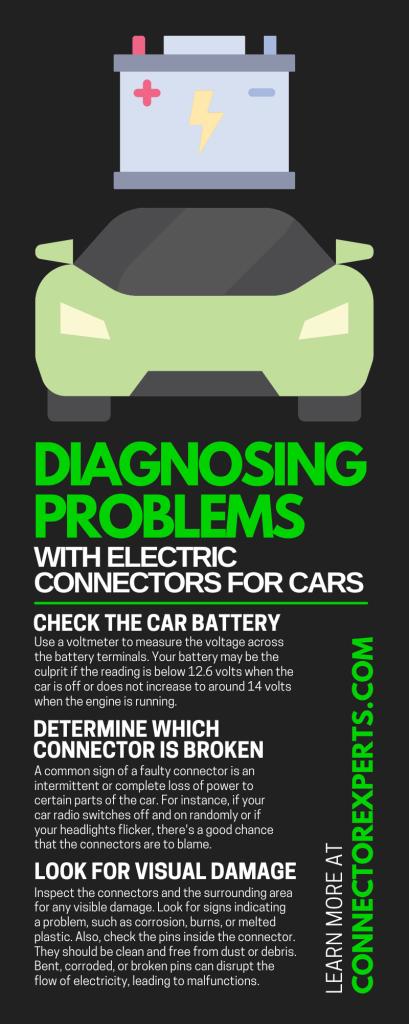Diagnosing Problems With Electric Connectors for Cars
Diagnosing Problems With Electric Connectors for Cars

Electric connectors are bridges that allow electrical power to flow from the battery to various car components, ensuring smooth operation. As a result, major issues can arise if one of the vehicle connectors begins to fail or malfunction. This article aims to equip you with the knowledge on how to diagnose problems with electric connectors for cars.
Check the Car Battery
Before evaluating the connectors, it is essential to rule out the possibility of a faulty car battery. The battery is the heart of your vehicle's electrical system, and if it's not functioning correctly, it can mimic connector-related issues.
Use a voltmeter to measure the voltage across the battery terminals. Your battery may be the culprit if the reading is below 12.6 volts when the car is off or does not increase to around 14 volts when the engine is running.
Determine Which Connector Is Broken
Once you have confirmed that the battery is not the problem, it's time to focus on the connectors. A common sign of a faulty connector is an intermittent or complete loss of power to certain parts of the car. For instance, if your car radio switches off and on randomly or if your headlights flicker, there's a good chance that the connectors are to blame.
By going through and testing the electrical components in the car, you can pinpoint which connector is causing the issue. You should also review the vehicle manual to ensure you know which connector links to each part.
Look for Visual Damage
Inspect the connectors and the surrounding area for any visible damage. Look for signs indicating a problem, such as corrosion, burns, or melted plastic. Also, check the pins inside the connector. They should be clean and free from dust or debris. Bent, corroded, or broken pins can disrupt the flow of electricity, leading to malfunctions.
If you notice any visual damage, it's best to replace the connector with an identical match; the new pigtail should be the same size and shape and have the same number of pins to ensure compatibility and a secure connection.
Use the Right Replacement
It's always best to replace the connector entirely rather than continue using a damaged or broken connector, as it may result in further problems. Likewise, never try to repair a damaged connector, as this can be dangerous and may lead to more significant issues.
Shop for Connectors
Connector Experts is your top option for genuine OEM automotive connectors in a range of options, including 9-pin connectors. With over 12 years in business, we can offer you needed assistance as you shop for the right replacement.
Perform the Wiggle Test
Nowadays, most mechanics use diagnostic tools to check for errors in the car's electrical system. However, you can also do it by hand. Complete the wiggle test as a swift and reliable diagnostic method. With the vehicle running, gently wiggle the connector and its wires while paying attention to the performance of the corresponding component. If there is a change in performance or if it completely fails, you have found your culprit.
In this diagnostic test, you can pinpoint the exact location of the issue and take the necessary steps to fix it. Leaving a damaged connector unchecked can cause serious damage to your vehicle's electrical system and even lead to safety hazards on the road.
Test Areas Within the Car
Always check electrical components within the vehicle, such as the headlights, turn signals, radio, and dashboard lights. If any of these systems are malfunctioning, checking the corresponding connectors for any issues is worth your time.
A faulty connector can wreak havoc on any car system that relies on electrical power. For example, a damaged fuel pump connector could lead to starting issues or sudden stalls while driving. A defective headlight connector may also result in flickering lights or total failure.
Signs of Problems With Electrical Connectors
Understanding the signs of problems is as important as knowing how to diagnose problems with electric connectors for cars. Some of these signs include:
- Complete loss of power to car components
- Random flickering of electrical systems
- Burning smell or visible damage on connectors
If you notice any of these signs, conducting a thorough inspection and taking the necessary steps to fix the issue before it escalates into a more significant problem is crucial. Timely action can save you from costly repairs and potential safety hazards on the road.
Flickering of Electrical Systems
Another common sign of problems with electrical connectors is random flickering or malfunctioning of lights, radios, or other electrical systems. This can occur due to loose or corroded connectors that cannot maintain a steady flow of electricity.
Changes in Performance
You may notice a sudden change in the vehicle's performance, such as the turn signals or headlights not working. Make sure to inspect all relevant connectors and address any issues promptly.
Complete Loss of Power
A common issue with electrical connectors is a loss of power to various car components. If your car's performance has decreased or certain systems are not functioning correctly, check the corresponding connectors for any potential problems.
Burning Smell or Visible Damage
If you notice a burning smell while driving or visible damage to the connectors, it's crucial to address the issue immediately. A burning smell can indicate overheated or damaged connectors, while visible damage can signify a more serious problem that you should address immediately. In this instance, always turn off the car to reduce the risk of an electrical fire.
Replacing Your Connectors
Once you determine that a connector is causing an issue within the vehicle, replace it with the appropriate automotive connector. Count the number of pins, measure the size and shape, and find a connector that matches the necessary specifications. Moreover, the needed replacement can vary depending on vehicle make, model, and year, so note these details before shopping.
Dealing with electrical connectors can be tricky and requires caution. It's best to seek professional help if you are unsure how to proceed or uncomfortable handling the issue yourself. With proper knowledge and timely action, you can ensure your car's electrical system remains in top condition, preventing potential problems on the road.
Connector Experts Can Help
We sell thousands of vehicle connectors in various shapes and pin numbers that perfectly match your vehicle. Connector Expert's has a team of experts and a wide range of products; we have you covered for all your connector needs. Trust us to provide high-quality, reliable connectors that will keep your car running smoothly.


You must login to post comments.